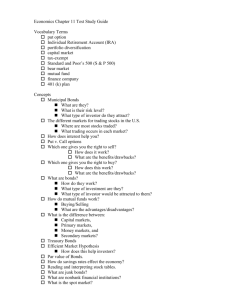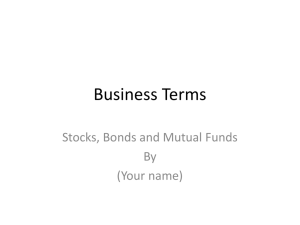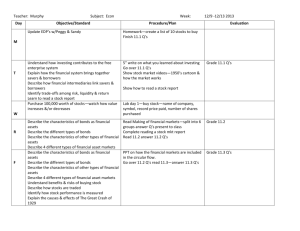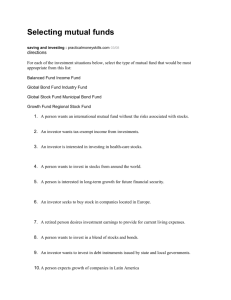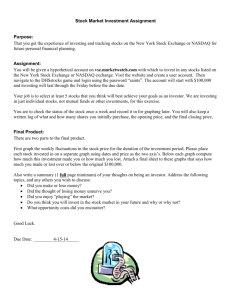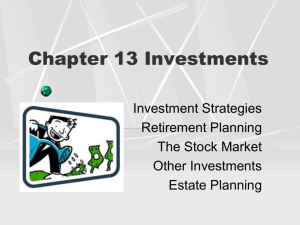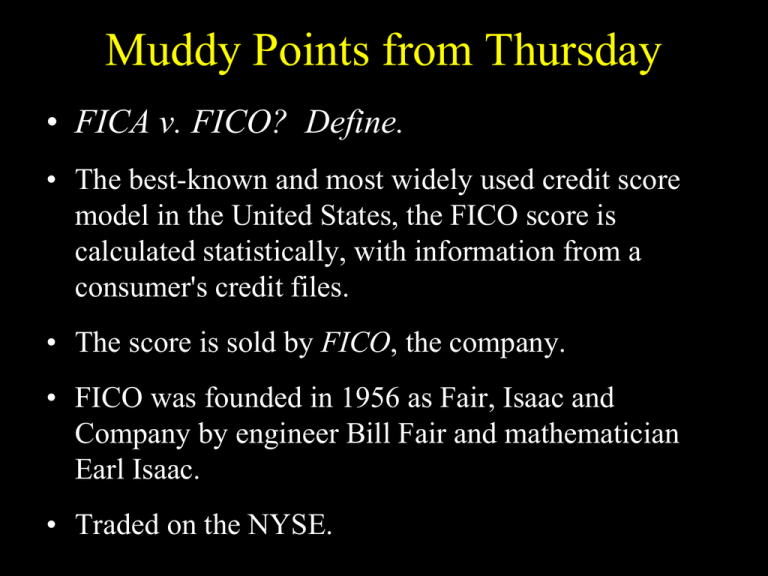
Muddy Points from Thursday
• FICA v. FICO? Define.
• The best-known and most widely used credit score
model in the United States, the FICO score is
calculated statistically, with information from a
consumer's credit files.
• The score is sold by FICO, the company.
• FICO was founded in 1956 as Fair, Isaac and
Company by engineer Bill Fair and mathematician
Earl Isaac.
• Traded on the NYSE.
Muddy Points
• FICA
• Federal Insurance Contributions Act:
– US Federal payroll tax imposed on both
employees and employers
– to fund Social Security and Medicare
Muddy Points
• If my econ class is only a semester long,
how much detail do I need to spend on
Annuity and Compound Interest equations?
• Economics course:
– Assume:
• High school
• Responsible for PFL as well as straight economics
Standard 3: Economics
Grade Level Expectation: High School
5. Analyze strategic spending, saving, and investment
options to achieve the objectives of diversification,
liquidity, income and growth.
– Selected Evidence Outcomes & 21st Century Skills:
•
•
•
•
Investments available for diversified portfolio
How economic cycles affect financial decisions
Investments to achieve liquidity, growth, income.
How compound interest manifests in investment and
debt situations.
Invest
Muddy Points
• Please provide recommended reading list
for PFL instructors, including:
– Case studies of individuals who have found
great earning success.
• I do not know of resource to suggest.
– Background information on how to motivate
students toward rational financial choices.
• If the students have opportunity to make money, they
are likely motivated.
Muddy Points
• Why are index funds capable of such low fees?
– Do not have to hire high cost portfolio managers and
researchers who pick the stocks.
• Merely buy the stocks in the Index
– e.g., the S&P 500
Muddy Points
• Can we go over Wednesday’s [tax calculation]
homework?
– No!
Hultstrom Household
•
•
•
•
•
•
•
•
•
•
•
Wage and Salary Income:
$20,000
Other Income:
$0
Purchases of Goods and Services:
$15,000
Value of Land and House:
$0
(renters)
Income Tax:
$1000 + ($10,000 x .20) = $3000
Payroll Tax:
$20,000 x .06
= $1200
Sales Taxes:
$15,000 x .05
= $750
Property Tax:
$0 x .01
= $0
Total Taxes:
$3000 + $1200 + $750 + $0 = $4950
Net Income (after tax):
$20,000 - $4950
= $15,050
Saving:
$15,050 - $15,000
= $50
Rodriguez Household
•
•
•
•
Wage and Salary Income:
Other Income:
Purchases of Goods and Services:
Value of Land and House:
• Income Tax:
$7000 + ($20,000 x .25)
• Detail behind this tax calculation?
$60,000
$0
$36,000
$100,000
= $12,000
Rodriguez Household
•
•
•
•
•
Wage and Salary Income:
Other Income:
Purchases of Goods and Services:
Value of Land and House:
Income Tax:
$7000 + ($20,000 x .25)
$60,000
$0
$36,000
$100,000
= $12,000
How calculate the $12,000 income tax?
$1000
+ $6000
10% of 1st $10,000 20% of next $30,000
$7000
+
+ $5000
25% of last $20,000
25% on income
from $40K to $100K
Rodriguez Household
•
•
•
•
•
•
•
•
•
•
•
Wage and Salary Income:
$60,000
Other Income:
$0
Purchases of Goods and Services:
$36,000
Value of Land and House:
$100,000
Income Tax:
$7000 + ($20,000 x .25)
= $12,000
Payroll Tax:
$60,000 x .06
= $3600
Sales Taxes:
$36,000 x .05
= $1800
Property Tax: $100,000 x .01
= $1000
Total Taxes: $12000 + $3600 + $1800 + $1000 = $18,400
Net Income (after tax):
$60,000 - $18,400
= $41,600
Saving:
$41,600 - $36,000
= $5,600
Jones Household
•
•
•
•
•
•
•
•
•
•
•
Wage and Salary Income:
$200,000
Other Income (interest & dividends):
$50,000
Purchases of Goods and Services:
$140,000
Value of Land and House:
$1,000,000
Income Tax:
$22,000 + ($150,000 x .30)
= $67,000
Payroll Tax:
$100,000 x .06
= $6,000
Sales Taxes:
$140,000 x .05
= $7,000
Property Tax: $1,000,000 x .01
= $10,000
Total Taxes: $67000 + $6000 + $7000 + $10000 = $90,000
Net Income (after tax):
$250,000 - $90,000
= $160,000
Saving:
$160,000 - $140,000
= $20,000
Proportional, Progressive, or Regressive?
• Income Tax: all income
Hultstrom HH%
Rodriguez HH
Jones HH
$3000
$12000
$67000
3000/20000 =
15%
12,000 /60,000 =
20%
67,000/250,000 =
26.8%
Progressive
Proportional, Progressive, or Regressive?
• Payroll Tax: wage & salary income
Hultstrom HH
Rodriguez HH
Jones HH
$1200
$3600
$6000
1200/20000 = 6%
3600/60000 = 6%
6000/200000 = 3%
Proportional, up to $100K
Regressive over $100K
• Payroll Tax: all income
– Regressive if there is any other income
• Since no payroll tax paid on other income
Proportional, Progressive, or Regressive?
• Sales Tax: on purchases of goods & services
Hultstrom HH
Rodriguez HH
Jones HH
$750
$1800
$7000
750/15000 = 5%
1800/36000= 5%
7000/140000 = 5%
Proportional
• Sales Tax: on all income
Hultstrom HH
Rodriguez HH
Jones HH
$750
$1800
$7000
750/20000 = 3.75%
1800/60000= 3%
7000/250000 = 2.8%
Regressive
Muddy Points
• Do you have practice problems for the
formulas?
– YES … see the Handout that was on your table
this AM.
• Good resource to read more about these?
– Wikipedia “time value of money”
Practice with Time Value of Money
(#1)
• Inherit $10,000.
– Invest at 8% for 40 years.
– Therefore: Pn = P0(1+i)n = 10,000(1.08)40
– Table A-3: n = 40, i = 8%
Factor: 21.725
Pn = P(Factor) = $10,000 (21.725) = $217,250
Practice with Time Value of Money
(#2)
• IRA has grown from $10,000 to $19,672 in 10 years.
– Find the “total return” (or CAGR).
– Therefore: Pn =
P0(1+i)n
–
19,672 = 10,000(1 + i)10
– Table A-3: n = 10, but we don’t know i.
But we do know that: Pn = P0(Factor) … therefore
Factor = Pn/P0 = $19,672/$10,000 = 1.9672
Read across n = 10, looking for Factor = 1.9672
Result: i = 7%
Practice with Time Value of Money
(#3)
• Find present value of $100,000 received 5 years from today.
• P0 = Pn/(1+i)n = 100,000/(1.12)5
• Or, using Table A-1:
– n = 5 and i = 12%
– Factor: 0.5674
– Thus, P(Factor) = $100,000(0.5674)
–
= $56,740.
Five-Year Annuity
Year:
P
P
1
2
P(1+i)4
P
3
P
P
4
+ P(1+i)3 + P(1+i)2 + P(1+i)1
5
+
P
(1 i) n 1
Value of Annuity Pn P
i
Factor in Table A-4 for n & i
• At age 18, you decide not to
purchase vending machine soft
drinks &save $1.50 a day.
Statement 9
• You invest this $1.50 a day at 8%
annual interest until you are 67.
• At age 67, your savings are almost
$150,000.
– Because of the power of compound
interest, small savings can make a
difference,
• about $300,000 in this case.
•
False
Save
P=
$547.50
Age:
50-Year Annuity
P
P
19
20
P(1+i)49
P
…….
+ P(1+i)48 + …
P
P
67
68
+ P(1+i)1 +
P
(1 0.08) 50 1
Value of Annuity P50 P
0.08
Factor in Table for n & i
Use Annuity Table to Calculate
• Annuity:
– n = 50 years
– i = 8%
– Factor: from the table:
• 573.77
– Annual annuity:
• 365 x $1.50 = $547.50
• Value of Annuity =
P (Factor)
= $547.50 (573.77) = $314,139
Two
Volunteers?
Like these?
Eat one at a time.
After eating each one, note on piece of paper how good each
successive one tastes – use of ranking of:
10 = absolutely delicious - the best
9 = really good, but not as good as a 10
8 = quite good, but not as high as a 9
. . . and so on …
3 = only fair
2 = mediocre
1 = less than a 2
0 = my lowest taste ranking – no more satisfaction eating
Life is Full of Gambles:
The Economics of Risk
• Go skiing
– Risk breaking your leg
• Drive to work
– Risk an auto accident
• Live in a house
– Risk a fire
• Savings in stock market
– Risk a fall in stock prices
• Savings in bonds
– Risk a rise in interest rates
• Invest U.S. T-bills
– Risk rapid inflation & loss
of purchasing power
A Bet Anyone?
• A third party will flip a coin:
– heads, I pay you $1,000
– tails, you pay me $1,000
• Anyone want to play?
Risk Aversion
• Most people would reject this bet
• Why?
• Most people are risk averse
– dislike bad things happening to them
– But more specifically,
– dislike bad things more than they like comparable good things
– That is,
• the pain of losing $1,000 > pleasure from winning $1,000
Data from Our Volunteer
• “Law of Diminishing Marginal Utility”
– or, diminishing marginal satisfaction
The cartoons even address marginal utility!
Definition
• Marginal benefit (utility, satisfaction):
• the added benefit gained from one more unit
– let’s assume your ranking (1 to 10) is also
your marginal utility or satisfaction
received from each cup
Another Example from
Previous Experiment
• For Reese’s Butter Cups
• How much you like (0 – 10) each added cup
– Last class volunteer ate 5 cups …
• data next slide
Marginal and Total Utility
Marginal
Quantity Benefit
1
10
Total
Utility
10
2
8
18
3
6
24
4
4
28
5
1
29
6
0
29
Utility
Q
MB
TU
35
30
1
10
10
2
8
18
20
3
6
24
15
4
4
28
Diminishing marginal utility
… total utility rises, but at
diminishing rate
25
10
5
5
6
1
0
29
29
0
0
1
2
3
4
5
6
Quantity of Cups
Utility
35
Total
utility
30
25
20
15
10
Suppose we measure wealth
on the horizontal axis
5
0
0
1
2
3
4
5
6
Wealth
Risk Aversion is Common
• Most people have diminishing marginal utility
basis for risk aversion in most people
• Logic:
– Dollar gained when income is low adds more to utility than a
dollar gained when income is high
– Having an additional dollar matters more when facing hard
times than when things are good
– Insurance: transfers a dollar from
• high-income states (where it is valued less) to
• low-income states (where it is valued more)
Dealing with Risk Aversion
• 1. Buy Insurance:
– Person facing risk pays a fee to insurance company
• Which agrees to accept all or part of financial risk
– Types of insurance:
• Health, Automobile, Homeowner (Renter), Disability, Life
• Living too long (fee paid today, annuity until die)
Insurance Activity
The Insurance Game:
Is Insurance Worth Buying?
• Divide into 9 Groups of 4 each (one 3)
• Distribute:
– One complete deck of cards to each Group
The Situation
• You are a young single person
– earning an annual income of $24,000
– living in a rented apartment
• You will have to decide:
– What types of insurance, if any, you want to buy
• and what level of coverage for each type
Risk:
Possibility of Financial Loss
• Risks you face: displayed on Visual 10 – 1
– Visual shows what could happen to you
Activity Procedure
• Each person select insurance & level of coverage
– Applies throughout the activity
• Each year:
– A card is randomly drawn in each group
what happens that year to each person in group
– e.g., “8” drawn each person needed:
» 10 office visits ($200 x 10) + $6,000 hospital
= $8,000, if no health insurance
– Note: replace the card into deck for the next year’s draw
Activity Procedure
(continued)
• “Double” card events (e.g, “K-K”):
– only occur if that card is drawn in consecutive years
• possible in year 2 and beyond, for example:
– Year 1: K drawn major fire causes $4K damages
– Year 2: K drawn K - K has occurred
one-year major disability costing $24,000 in income
Activity 10 – 1: Insurance
• Different types (5) of insurance from which to choose:
–
–
–
–
–
Health
Automobile
Renter’s
Disability
Life
• Within each, several options for amounts of coverage
– As coverage rises premium rises due to higher insurance
company payout
– NOTE: premiums shown are annual, covering you one year
Types of Insurance & Terms
• Health
– Co-pay: amount you pay for each office visit
– Hospitalization: insurance company pays % shown
• Automobile
– Deductible: amount you must pay due to accident
• Insurance company pays anything above deductible
– combine comprehensive and collision for simplicity
• Liability: protects from damages you cause others up to
amount shown
– you are responsible for additional
Types of Insurance
• Renter’s Insurance
– Deductible: amount you have to pay on loss
• Insurance company covers above deductible
• Covers: loss of personal property
• Disability Insurance
– Each unit coverage pays $500 /mo for lost income
• Maximum of 4 units = $2,000/month $24,000/year
• Life Insurance
– Each unit pays beneficiaries $10,000
Weigh Benefit vs. Cost in
Making Insurance Decision
B(X)
C(X)
Reduce losses when “bad
things” happen to you
Insurance Premiums
you pay
- see Activity 10 – 1
- see Activity 10 – 1
Forgetting anything …??
Key Economic Concept
Revisited
• Choice involves cost
» choosing is refusing
» choose to buy insurance
» refuse to invest $ spent on premiums
» suppose could earn 10%
» $1,000 on premium
$100 return foregone
Weigh Benefit vs. Cost in
Making Insurance Decision
B(X)
C(X)
Lower losses when “bad
things” happen
- see Activity 10 – 1
Insurance Premiums paid
+
Lost Return on Premium
In our example: $1,000(1 + 0.10) = $1,100
Now Ready to Complete
Activity 10 – 1
• Decide what types & levels of coverage you desire
– RESTRICTION: ALL states require basic liability
coverage with car insurance, so you must choose at least
Option 3
• Since no way of knowing what will happen to you, there is no
exact right amount of insurance
– Goal: buy enough coverage to protect yourself from losses,
but not so much that you end up spending far more on
insurance than it is worth.
• Compare B(X) v. C(X) & make choice with which you
are comfortable
Activity 10 – 2
• Enter the Total Annual Insurance Premiums
(bottom of Activity 10 – 1) for every year in
Column (1) of Activity 10 – 2.
– i.e., premium is constant throughout
• Then, complete Column (2) for every year
– opportunity cost constant throughout
Your Life is About to Begin
• Each year – shuffle the deck, then one person in
each group draw one card at random
– Each person in group experiences same event
depicted in Visual 10 – 1.
– Then:
• Fill in Column (3) –actual loss if you had no insurance
• Fill in Column (4) – actual loss if you had insurance
– Same event for all in group, but since not same
coverage, Column (4) may differ for each member
– Each group is experiencing a different “life”
Conduct 8 Years
• Completing Columns (3) – (4) after each
year’s draw
• After completing 8 years:
– Sum the values in Column (4)
– Fill in the blanks at the bottom of Activity 10 – 2
• Questions?
• Begin . . .
Activity Debrief
• Who is really happy that you bought the
insurance you did?
• Who wishes you would have purchased a
lot less insurance?
The Nature of Insurance
• If you experienced particularly costly events, likely
happy if you bought a lot of insurance
– Losses without insurance would have been much bigger
• If you experienced fairly inexpensive events, likely
unhappy if you bought a lot of insurance
– Losses without insurance would have been much less.
Premiums Based on Expected
Payouts of Insurance Company
(plus operating cost and profit)
• Thus,
– There must be some people who pay more in
premiums than they get back in claims
• and perhaps feeling they shouldn’t have purchased so
much coverage
– The insurance company uses this extra premium
to pay the claims of those who pay less in
premiums than claims.
Insurance
• Every insurance contract is a gamble:
– Possible that you will not have accident
– Most years you pay premium
• get nothing in return, except peace of mind
– Insurance company counting on fact that most
people will not make claims
• or they couldn’t survive
Insurance & the Economy
• Insurance:
– Does not eliminate risk
• but spreads it around
– For example:
• Owning fire insurance does not reduce the risk of losing
your home in fire
– You could suffer “moral hazard” – take less care due to insurance
• But if the unlucky event occurs,
– the insurance compensates you
• Risk shared among thousands of insured people
Simple Insurance Example
• Assume:
– 100 young people all face the same risk of loss
• statistically, only 1 accident occurs per year
• if an accident occurs, the injured party has an accident loss
of $2,000
– such a loss is catastrophic for one person to bear
• Idea: let’s spread the risk (insurance)
– Since one accident occurs per year
• Our “society” incurs a loss of $2,000 per year
• So,
– each of the 100 people pay an “insurance premium” of:
» $20 per year
A Little More Reality
• The “society” decides that the burden of administering their
internal insurance plan is too great
– getting collections of premiums, etc.
• So, one person (an entrepreneur) says,
•
“I’ll handle all the details if you pay me $500 per year.”
• Now, what happens to the premiums?
– $2,500/100 = $25
– Greater than the expected loss of each person:
• (Prob of accident) x ($ loss if accident) = 0.01($2,000) = $20
What Should We Insure?
• Since cost of insurance > expected loss
• NOT a fair game!
• Insurance is NOT a fair bet!
– So, most economists recommend insurance for:
• large potential losses where you will be severely impacted
if accident occurs – catastrophic loss
– e.g., Cancer or Liability
• But don’t necessarily insure small risk events
– that you could self-insure
Overinsure?
• 34.4% of new-car buyers bought extended-warranty
– up from 23.5% in 1999
• With the average car dealer now losing money (or making little)
on each car sale, selling extended warranties is an important
source of dealer profits
– 65% of respondents said they spent significantly more for the
new-car warranty than they got back in repair savings
Early Retirement
• Less time to build nest egg
• More time to live off nest egg
– (But, studies find people who retire earlier live shorter lives)
→
early retirement is a risky choice
later retirement is less risky choice
• Retirement Data from the Department of Labor Statistics
Age Range
Labor Force Participation Rate (%)
1988
2012
55 – 64
54.6
64.5
65 – 74
16.0
26.8
Over 75
4.3
7.6
• This trend is likely to continue going forward.
Problem: How to Invest My Savings
Criteria
Alternatives Risk
Bonds
Stock
Savings Acct
Return Liquidity Income
Risk
• . . . comes in many forms
– Liquidity risk, default risk, purchasing power risk
• . . . In this session we’ll only address a couple
more types
Purchasing Power Risk
• Inflation risk
– T-bills (zero-coupon) have very little volatility risk
Recent 10-Year Period
2002–2011
$3
•
Treasury bills
1.8
$1.20
1
0.50
2002
2004
2006
2008
2010
Past performance is no guarantee of future results. Hypothetical value of $1 invested at the beginning of 2002. Assumes reinvestment of income and no transaction costs or taxes. This
is for illustrative purposes only and not indicative of any investment. An investment cannot be made directly in an index. © 2012 Morningstar. All Rights Reserved. 3/1/2012
Purchasing Power Risk
• Inflation risk
– T-bills (zero-coupon) have very little volatility
risk, but
• May not keep up with inflation
Lose purchasing power.
Recent 10-Year Period
2002–2011
$3
•
Treasury bills
1.8
•
Inflation
2.5
$1.28
$1.20
1
0.50
2002
2004
2006
2008
2010
Past performance is no guarantee of future results. Hypothetical value of $1 invested at the beginning of 2002. Assumes reinvestment of income and no transaction costs or taxes. This
is for illustrative purposes only and not indicative of any investment. An investment cannot be made directly in an index. © 2012 Morningstar. All Rights Reserved. 3/1/2012
Purchasing Power Risk
• Inflation risk
– T-bills (zero-coupon) have very little volatility
risk, but
• May not keep up with inflation
Lose purchasing power.
– Coupon bonds also face inflation
interest rate risk
Stocks, Bonds, Bills, & Inflation: 1926–2012
$10,000
CAGR (%)
1,000
•
•
Govt bonds
5.7
Treasury bills 3.56
$123
100
$21
10
1
0.10
1926
1936
1946
1956
1966
1976
Past performance is no guarantee of future results. Hypothetical value of $1 invested at the beginning of 1926.
Assumes reinvestment of income and no transaction costs or taxes. This is for illustrative purposes only and not indicative
of any investment. An investment cannot be made directly in an index. © 2012 Morningstar. All Rights Reserved. 3/1/2012
1986
1996
2006
Ibbotson® SBBI®
Why Do So Many Fear
the Stock Market?
• It’s a dangerous, volatile
place
– … thousands of sophisticated
traders and brokers lurk to
steal your hard-earned
money!
• Many call it “gambling!”
• But maybe the real source of
fear is . . .
Adults Invested in the Stock Market
Market Volatility Risk
Smooth and Steady: 1926–2012
1
1926
1936
1946
1956
1966
1976
1986
1996
2006
A Bumpy Ride: 1926–2012
1
1926
1936
1946
1956
1966
1976
1986
1996
2006
Why Would Anyone Take This Risk?
In High School
saving for college
In college and now
need the money
Another spot to
conduct this
activity
• Raise the benefit
– Now, B(X) > C(X),
• Choose the bar with the reward!
– where B(X) = benefit of action X
Key Economic Concept
People respond to incentives
Would You Ride a Bull?
– For $5?
–
–
–
–
for $50?
for $500?
for $5,000?
for $50,000?
• Likely to get more risk
takers as the reward rises!
Since Choice has a Cost
• Why choose it?
• People choose X if:
•B(X)
B(X)
> C(X)
C(X)
Greater Return . . .
accept the risk of:
– Riding the Bull
– Riding the
Roller Coaster
… or
Stocks and Bills: 1926–2012
CAGR (%)
•
Large stocks
•
Treasury bills 3.56
$3,533
9.8
$21
0.10
1926
1936
1946
1956
1966
1976
1986
1996
2006
Strategies for Dealing with Risk
Strategies for Dealing with Risk
1. Market Timing: Buy low, sell high!
$
Try to take advantage
of volatility by “timing”
Time
How Do Investors Fare?
(Study by Dalbar, Inc.)
• 1984 – 2000:
– S&P 500 (geometric mean ≡ total return) + 16.3%
– Avg stock mutual fund investor (IRR):
+ 5.3%
• What’s happening?
Mutual Fund Merry-Go-Round
• Possible explanation:
– Investors lack discipline to “buy and hold”
• Chase the HOT fund, but
– This year’s star is next year’s dog
10-year mutual
fund total
return Fund=Performance
6.94%
Hot-Hand
Fallacy:
Chasing
10-year average investor return
$45k
40
= – 20.24%
$6 billion
Cash flows
5
35
4
30
3
25
$10,000 in Mutual Fund
2
20
1
15
0
10
–1
5
–2
0
–3
2001 2002 2003 2004 2005 2006 2007 2008 2009 2010
© 2011 Morningstar. All Rights Reserved. 3/1/2011
Dangers of Market Timing
1926–2009
$3,000
2,500
$2,573
$1.00 invested in
1926 in S&P 500
$1(1.098)84
2,000
1,500
S&P
minus
best
37/1,008
months
1,000
500
0
$19.66
S&P 500
$20.53
Treasury bills
© 2010 Morningstar. All Rights Reserved. 3/1/2010
Ibbotson® SBBI®
Advice Worth Heeding!
• “I’ve seen people get famous for being right
once in a row.”
• “Smart investing doesn’t consist of buying
good things, but rather of buying things
well. Price is what matters most for
investment success.”
• Howard Marks
Can you predict this?!
Market Timing?
Geometric Mean – Common Use
• Mutual funds & financial analysts refer to as:
– “total return”
– “compound annual growth rate” (CAGR)
• a time-weighted rate of return
• nothing added or withdrawn during the period
• e.g., started with $1.00 . . .
– did not deposit or withdraw
– did not withdraw any interest or dividends
Reasonable measure of mutual fund management because
it ignores variables that are outside the manager’s control
Is Geometric Return Good for Evaluating
Individual Investor Performance?
• Total return:
– computed by assuming that investors deposit
money at the beginning of the period
– and pursue a buy-&-hold strategy
• Many investors deposit & withdraw funds
– i.e., many investors do NOT buy & hold
– need a “dollar-weighted” rate of return
• that takes into account the flow of funds in & out
Example: Investor Facts
•
•
•
•
•
Purchased 100 shares of mutual fund @ $20
During 1st year, fund’s P rises by 30%, to $26
Begin of 2nd year, purchase 200 shares @ $26
During 2nd year, P fell by 4% to end @ $24.96
End year 2: investor sells all shares @ $24.96
Summary
Begin Year 1
Deposit: $2,000
Begin Year 2
Deposit: $5,200
End Year 2
Withdraw: $7,488
Evaluating the Fund Manager
$1(1+i1)(1+i2)
• Use geometric return • Thus, $1(1+.3)(1-.04) = $1.248
≡ Total Return
≡ time-weighted return
• Year 1: +30%
• Year 2: - 4%
• To solve for total return:
• $1(1+ig)2 = 1.248
•
1 + ig = 1.248(0.5) = 1.117
• Thus, ig = 0.117, or 11.7%
Reasonable measure of mutual fund management
because it ignores variables outside the manager’s control
Is Total Return a Good Measure of
Our Investor’s Performance?
• When there are cash flows into & out of an account,
– we must use “internal rate of return” (IRR) calculation.
• Definition of IRR:
– The rate of interest that satisfies the condition that
the sum of the present value of the outflows
is equal to the sum of the present value of the inflows.
– Math Behind the Market, p. 60
– or
– the interest rate that makes the net present value of an
investment equal zero.
Setting Up IRR
Begin Year 1
Begin Year 2
End Year 2
Deposit: $2,000
Deposit: $5,200
Withdraw: $7,488
• The interest rate that makes the net present value = 0
$2,000 $5,200 $7,488
NPV
0
0
1
2
(1 i )
(1 i )
(1 i )
Solution
• This particular problem could be solved by
using quadratic formula, however
– Many more complicated problems must be
solved through computer iteration
• Using Microsoft Excel:
• IRR = IRR(-2,000, -5,200, 7,488) = 0.031
– i.e, the investor earned 3.1% per year IRR
Total Return v. Investor Return
• In this example,
– the geometric return (total return) is:
• 11.7%
– time-weighted, assumes buy-and-hold by investor
– the IRR (Investor Return on Morningstar) is:
• 3.1%
– a dollar-weighted return
• Why such a significant difference?
– Many investors chase hot funds ...
Recall: Investor Facts
• Purchased 100 shares of mutual fund @ $20
• During 1st year, fund’s P rises by 30%, to $26
• Begin of 2nd year, purchase 200 shares @ $26
• During 2nd year, P fell by 4% to end @ $24.96
• End year 2: investor sells all shares @ $24.96
• Chase what’s hot …
– first year:
– second year:
– end 2nd year:
30% return:
- 4% return
it’s down:
buy, buy, buy
sell, sell, sell
Study by Dalbar, Inc.
• Geometric mean return: S&P 500 recent 20
year period (1988 – 2008)
– ≈ 12%
• i.e., if buy and hold, earn 12% annual rate of return
• Average investor return (IRR)
– takes into account inflow & outflow
• i.e., chasing hot funds!
– ≈ 4%
Prudent Strategies to Deal with Risk
2. Invest for the Long Term
or, spread risk
over more years!
. . . if you think long-term, the
ups exceed the downs.
Small Stocks
1926–2010
$10,000
• Small
stocks
12.1%
1,000
100
10
1
0.10
1926
1936
1946
1956
1966
1976
Ibbotson® SBBI®
1986
1996
2006
© 2011 Morningstar. All Rights
Reserved. 3/1/2011
Which gray
circle is bigger?
Which gray bar
is longer?
Are the gray
horizontal lines
parallel?
What Do You See?
© 2011 Morningstar. All Rights Reserved. 3/1/2011
They are the
same size
They are the
same size
The horizontal
lines are parallel
Key Insight from Behavioral Economics:
Humans Don’t Always View Things Rationally
© 2011 Morningstar. All Rights Reserved. 3/1/2011
Short-Term Focus
Focus on short-term instead of long-term risk
Result:
Time-inconsistent behavior
Interest in long term but act short term
Overly sensitive to recent volatility
Act as though time horizon far shorter than it is
Short-Term Focus
When shown a distribution
of 1-year returns
Stocks
Bonds
When shown a distribution
of 30-year returns
10%
40%
60%
90%
Source:
Shlomo Benartzi and Richard H. Thaler, “Risk Aversion or Myopia?
Choices in Repeated Gambles and Retirement Investments,” March 1999.
Reduction of Risk Over Time
1926–2006
150%
Small stocks
Large stocks
Government bonds
10.4%
5.4%
Treasury bills
120
90
60
30
12.7%
3.7%
0
-30
-60
1-year
5-year
Holding period
20-year
1-year
5-year
20-year
1-year
5-year
20-year
1-year
5-year
20-year
1926–2009
Geometric
Return
Largest Standard Deviation?
Smallest
Arithmetic
annual
return
Standard
Deviation
Large
stocks
9.8%
12.3%
20.5%
Small
stocks*
11.9%
17.4%
32.8%
Government
bonds
5.4%
5.8%
9.6%
Treasury
bills
3.7%
3.8%
3.1%
Inflation
3.0%
3.1%
4.2%
Histograms
–90%
*Small company stock total return (1933) = 142.9%.
0
90%
Nominal GDP & the S&P 500
Prudent Strategies to Deal with Risk
Don’t Put All Your
Eggs in One Basket
• All money in one stock?
– Could spill all the eggs
It Can Be Tempting!
• All Your Eggs in One Basket?
– Great if you “hit it big”
• Wal-Mart
– If you had purchased $1,000 of Wal-Mart
stock in 1970 at its IPO
– held it through 1999, would have grown to:
» over $6,000,000!
• Not so great if things go south
– Enron
Prudent Strategies to Deal with Risk
3. Diversify
Don’t Put All Your
Eggs in One Basket
• Diversify across asset class
– Stocks and bonds
• Diversify within asset class
– Stock from different
industries
Benefit of Diversification
$
Time
Cost of Diversification
$
Time
Diversified Portfolios
1987–2006
$20
10
• Portfolio 1 (100% Stocks)
11.8%
• Portfolio 2 (50% Stocks, 50% Bonds)
9.6%
• Portfolio 3 (100% Bonds – 5 yr.)
6.8%
$9.31
$6.25
$3.72
1
1987
199
2
1997
2002
A Bull
Market
• “Characterized by optimism, investor confidence
and expectations that strong results will continue.
• The use of “Bull” to describe markets comes from
the way bulls attack their opponents. A bull thrusts
its horns up into the air. These actions are
metaphors for the movement of a market. If the trend
is up, it’s a “bull market.”
A Bear Market
A bear will swipe its paws
downward upon its unfortunate
prey
• Downward trend in the market that investors believe will
continue in the long run, which, in turn, perpetuates the
spiral.
• Downturn of 20% or more in multiple broad market
indexes, such as the DJIA or S&P 500, over at least a twomonth period
– not to be confused with a correction
• a short-term trend with duration < two months
Diversification – Cost & Benefit
$3,000
Bull market
$1,500
Bear market
$1,484
$2,555
2,500
1,250
$985
2,000
1,000
$1,763
1,500
750
$1,181
$624
• Stocks
• 50/50 portfolio
1,000
500
• Bonds
250
500
1996
1997
1998
1999
2000
2001
2002
Risk & Return Diagram
Return
(%)
12
100% Stocks
10
60% Stocks
40% Bonds
8.4
8
6
100% Bonds
4
5
7
9
11
?
13
15
Risk (% standard deviation)
17
Risk & Return Diagram
Return
(%)
12
100% Stocks
10
60% Stocks
40% Bonds
8.4
8
6
100% Bonds
4
5
7
9
11
?
13
15
Risk (% standard deviation)
17
Return
(%)
• The Efficient Frontier
12
100% Stocks
10
8.4
60% Stocks
40% Bonds
8
6
If there were no benefit
from diversification, then
we would lie upon this
linear combination of
bonds and stocks
100% Bonds
4
5
7
5.92
9
11
13
15
Risk (% standard deviation)
17
Return
(%)
Actual Stock Market: 1970–2006
13
100% Stocks
Efficient frontier
12
80% Stocks, 20% Bonds
60% Stocks, 40% Bonds
11
50% Stocks, 50% Bonds
25% Stocks, 75% Bonds
10
100% Bonds
9
10
11
12
13
14
15
Risk (% standard deviation)
16
17
What Makes This Work?
• How can we combine stocks and bonds
– and get a portfolio mean return that is the
weighted average of the stocks and bonds
– but the standard deviation (volatility) is
lower than either stocks or bonds?
Correlation is High in Crisis
Diversified Portfolios in Various Market Conditions
Performance during and after select bear markets
$1,250
Mid-1970s recession (1973–76)
2007 bear market & aftermath
(Nov 2007–Dec 2010)
$1,072
$1,150
1,000
$872
$1,014
750
•
Stocks
• Diversified portfolio
500
35% stocks, 40% bonds,
and 25% Treasury bills
250 Jan
1973
•
Jan
1974
Jan
1975
Jan
1976
Nov
2007
Nov
2008
Nov
2009
Past performance is no guarantee of future results. Diversified portfolio: 35% stocks, 40% bonds, 25% Treasury bills. Hypothetical value of $1,000 invested at the beginning of January 1973 and Nov 2007,
respectively. This is for illustrative purposes only and not indicative of any investment. An investment cannot be made directly in an index. © 2011 Morningstar. All Rights Reserved. 3/1/2011
Nov
2010
Risk & Stock Diversification
Diversifiable
Risk
Market Risk
1
2
4
6
8
16
30
50
100
Number of stocks in portfolio
1000
Too Much of a Good Thing?
• Diversification has benefits, but …
Over-Diversification?
• Peter Lynch refers to “di-worse-ification”
– mutual funds might purchase so many
separate companies
• Selecting companies lower on value list
– dilutes return
How Achieve Diversification?
• Passive management approach
– “index funds”
• Achieve “market” rate of return
– Slightly below, due to cost
• Active management approach
– Assumes can “beat the market”
– Tough to do.
– Higher costs due to portfolio selection
“Beauty Contest”
• Rules of the Game:
– Each player will select a number from 0 to 100
– Winner is the player whose number is closest to
the number that is 70% of the average of all
player chosen numbers.
Active Management
• A. Do it yourself:
– Adequate diversification requires > $50,000
– NASD survey
• People overestimate their abilities/understanding
– Expensive hobby – why do it yourself?
• Maybe you can beat the market!?
• You want to learn for later career
• You simply have fun with it
Active Management
• B. Professional management
– Investment adviser
• Typical fee: 1% of asset value
– Mutual fund
Diversify with Mutual Funds
• Mutual fund pools investors’ money
• Puts it into the markets on your behalf
– you own small amounts of many different assets
• Good way to avoid the risk that comes from
owning any one asset
Picking Mutual Funds?
• Check on web sites for fund
– e.g., Fidelity.com, Vanguard.com, Roycefunds.com
• Factors to consider:
– Longevity/stability of fund managers
– Management investment philosophy
• Long-term focus; not over diversified
–
–
–
–
Management track record
Expense ratios: preferably less than average of 1.5%
Portfolio turnover: preferably below 20%
Preference for “no load” funds
Small Sample of Funds
• Locate names of funds through
– Recommendations
• From other friends
• From Wall Street Journal, or other articles
– Search recommendations by:
• Morningstar.com
• Other firm
– Then, review web page of fund for information . . .
• Not necessarily recommended,
– although appeared satisfactory at one time
Equity
Income
Fund
• Objective:
– provide substantial dividend income as well as
long-term capital appreciation through
investments in common stocks of established
companies.
• Turnover rate: 12% of fund
– % of fund bought and sold during year
Fund Performance
(through March 2013)
• T. Rowe Price:
– 5-year total return: 5.5%
– 10-year total return: 9.0%
– Since 1985:
11.0%
• Benchmark: S&P 500
– 5-year total return:
6.0%
– 10-year total return:
– Since 1985:
8.0%
10.5%
Minimum amount required to open an account:
$2,500
IRA minimum:
$1,000
Investment Philosophy
• This fund offers a relatively conservative, value-oriented way to
pursue substantial dividend income and long-term capital growth
potential.
• It invests in common stocks of established firms that are expected to
pay above-average dividends. Price/earnings or P/E ratio: 13.8
• By investing in stocks that appear to be out of favor or undervalued,
the fund should be less volatile than one investing in growth stocks.
• If, as the manager expects, the underpriced holdings regain favor in
the marketplace, their stock prices may rise—providing capital
appreciation opportunities.
• The value approach carries the risk that the market will not recognize
a security’s true worth for a long time, or that a stock judged to be
undervalued may actually be appropriately priced.
•
•
•
•
•
•
•
•
•
•
AT&T
Apache
Chevron
Exxon Mobil
General Electric
International Paper
JPMorgan Chase
Royal Dutch Shell
US Bancorp
Wells Fargo
Top 10 Holdings
Sector
Diversification
•
•
•
•
•
•
•
•
•
•
Financials
Industrials & Busn Services
Energy
Consumer Discretionary
Information Technology
Health Care
Utilities
Consumer Staples
Materials
Telecommunication Services
20.3%
14.0%
13.8%
10.4%
8.0%
6.9%
5.9%
5.6%
4.6%
3.8%
Portfolio Manager
• Brian C. Rogers
• B.A., Harvard College
• M.B.A., Harvard Business School
– Managed Fund Since: 10/31/1985
To Summarize
Three Key Variables
Pn = (1 + i)n P0
• How much one saves out of income
Three Key Variables
PN = (1 + i)n P0
• Interest rate,
i
– Compound interest is
powerful
– e.g., consider 2 cases:
one-time investment of
$10,000 for 40 years
– A invested at 8%
– B invested at 5%
Power of Compounding: Importance of i
2010 - 2050
$300,000
$250,000
PN = $10,000(1.08)40 $217,245
$200,000
PN = P0(1+i)n
$150,000
= $10,000(1.05)40
$100,000
$50,000
$70,400
$10,000
$10,000
$0
Investment A
Years invested:
40
Amount Contributed: $10,000
Rate of return:
5%
Investment B
40
$10,000
8%
U.S. T-Bills & S&P 500, 1926–2010
$10,000
1,000
Large stocks 9.9%
3.6%
• T-bills
•
$2,982
2.7 times
greater
142 times
greater!
100
$21
10
1
0.10
1926
1936
1946
1956
1966
1976
Ibbotson® SBBI®
1986
1996
2006
© 2011 Morningstar. All Rights
Reserved. 3/1/2011
Have Been Focused on
Market Volatility Risk
$10,000
1,000
100
Can avoid volatility risk with T-Bills
10
1
0.10
1926
1936
1946
1956
1966
1976
Ibbotson® SBBI®
1986
1996
2006
© 2011 Morningstar. All Rights
Reserved. 3/1/2011
However, “Every Choice Has a Cost!”
$10,000
• Inflation risk
Compound Annual Return (%)
– maintain
purchasing
power
1,000
T-bills
• Inflation
3.6
3.0
•
100
$21
•
Real return
0.6
$12
10
1
0.10
1926
1936
1946
1956
1966
1976
Ibbotson® SBBI®
1986
1996
2006
© 2011 Morningstar. All Rights
Reserved. 3/1/2011
Dealing with Inflation Risk?
Mind the Gap in Rates of Return
$16,055
$10,000
• Small
1,000
100
stocks
• Large stocks
• Gov’t bonds
• T-bills
• Inflation
$2,982
12.1%
9.9
5.5
3.6
3.0
$93
$21
$12
10
1
0.10
1926
1936
1946
1956
1966
1976
Ibbotson® SBBI®
1986
1996
2006
© 2011 Morningstar. All Rights
Reserved. 3/1/2011
Two Key Variables
n
PN = (1 + i) P0
• Interest rate, i
• Length of investment, n
– Start early to benefit from
compounding
– Consider investors A & B
– Both invest in S&P 500:
• A invests $2,000 per year from
1990 - 1999, then watches grow.
• B invests $4,000 per year from
2000 - 2009.
– Note: these are “annuities”
Power of Compounding: Importance of n
Investor A
Investor B
$140k
120
Investor A
100
1990 – 2009
Investor B
2000 – 2009
80
60
$60,759
$40,000
40
$20,000
Invested in
S&P 500
$42,118
Invested in
S&P 500
20
0
Annual contribution: $2,000
Annual amount contributed: $4,000
Years contributing:
Years contributing:
10
10
Two Key Messages from
Compound Interest Story
• Save and Invest . . .
• Consider . . .
– Early – Stocks
Conclusion
• Take a long-term perspective
• Reinvest interest, dividends
• Do not remove principal
• Don’t chase the hot fund!
• Recognize the importance of:
• Starting early, and
• Minding the gap – pay attention to rates of return
– some stocks (via mutual/index funds) in portfolio
• Diversify
– Through mutual funds

